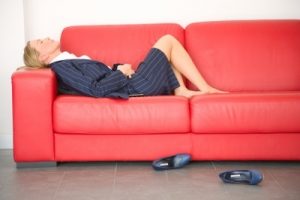Trouble Sleeping? Blame Too Many Calories Or A Bad Diet
 Binge eating has often been linked to disturbed sleep patterns, but new research explains just how important diet is when it comes to getting a healthy snooze every night.
Binge eating has often been linked to disturbed sleep patterns, but new research explains just how important diet is when it comes to getting a healthy snooze every night.
A study from the Perelman School of Medicine at the University of Pennsylvania found that people with distinct eating habits also had specific sleeping patterns.
Short sleepers
For the purposes of the study, short sleepers were defined as those getting less than five hours of sleep a night, normal sleep was seven to eight hours and long sleep was nine or more hours per night.
Short sleepers all shared a few things in common: they drank less water and consumed more calories. They also consumed fewer carbohydrates and lycopene, which is found in red and orange-hued fruits and vegetables.
The study authors note that sleep and diet are intricately intertwined, as sleep can affect appetite and diet can affect sleep patterns. Study author Michael Grandner, an instructor in psychiatry and member of the Center for Sleep and Circadian Neurobiology at Penn., elaborates:
For example, iron deficiencies have been linked to restless leg syndrome in some cases. There may be certain substances that work on the molecular level to regulate some of the biological machinery of sleep, but there hasn’t been a lot done to tease that apart, and this study may be one of the first to help point us in the right direction of where to look.
Normal and long sleepers
Long sleepers ate the fewest calories, the study found, but they also consumed the most alcohol. Normal sleepers were showed to eat the highest variety of foods, which is important for getting the most necessary nutrients.
The researchers note that while the study points out general trends, there is no set formula or a one-size-fits-all approach to diet and sleep.
“It reminds people that we have come to the point in our society where we recognize that our diet is important to our health,” says Grandner. “We don’t always act on it, but we recognize it.”
Source: TIME
Image courtesy of Ambro / FreeDigitalPhotos.net
 Eating Disorder Self Test. Take the EAT-26 self test to see if you might have eating disorder symptoms that might require professional evaluation. All answers are confidential.
Eating Disorder Self Test. Take the EAT-26 self test to see if you might have eating disorder symptoms that might require professional evaluation. All answers are confidential.